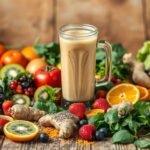
The Best Immune-Boosting Smoothies for Busy Mornings
April 24, 2025
7 Signs Your Body Needs an Immune Reset (and What to Do)
April 24, 2025I’ll never forget the winter I spent battling one cold after another. My medicine cabinet overflowed with pills and powders promising protection, but nothing stuck. Then, a friend asked me a simple question: “What if your plate could do the heavy lifting instead?” That conversation changed everything.
I started swapping synthetic supplements for meals packed with leafy greens, citrus, and garlic. Within weeks, I felt like my body had found its rhythm again. Research backs this up—foods rich in vitamin C, zinc, and antioxidants don’t just support your immune system; they help it thrive naturally.
Take spinach, for example. One study showed its vitamin A content may help increase white blood cell activity. Oranges and bell peppers? They’re like nature’s multivitamins. Even humble garlic contains compounds that boost immune responses. The best part? You’re not swallowing pills—you’re savoring meals.
In this article, I’ll share how to harness everyday ingredients to create a resilient foundation for your health. No complicated routines or expensive products—just practical, science-backed strategies that fit into real life.
Key Takeaways
- Whole foods like citrus and leafy greens provide nutrients critical for immune health
- Supplements aren’t required when eating a balanced, nutrient-dense diet
- Vitamin C-rich foods support white blood cell production naturally
- Garlic contains compounds that enhance immune responses
- Simple dietary changes can create lasting wellness benefits
Understanding Immunity and Natural Foods
Remember when your mom told you to eat your veggies? Turns out, she was onto something bigger than just cleaning your plate. Your body’s defense network relies on what you feed it—and the right choices can make all the difference.
What Is the Immune System?
Think of your immune system as a security team. White blood cells patrol your bloodstream, while antibodies act like bouncers tagging unwanted guests. Even your skin and gut lining serve as physical barriers. Here’s the kicker: these defenders need specific fuels to work optimally.
| Component | Role | Key Nutrients |
|---|---|---|
| White Blood Cells | Identify and attack invaders | Vitamin C, Zinc |
| Antibodies | Neutralize threats | Protein, Iron |
| Skin/Gut Barriers | Block pathogens | Vitamin A, Omega-3s |
How Real Food Supports Health
Whole ingredients deliver nutrients in forms your body recognizes. Citrus fruits provide vitamin C to energize white blood cells, while leafy greens offer folate to help produce new defense cells. A 2021 study found that compounds in broccoli sprouts enhance antibody production by up to 40% compared to isolated supplements.
Here’s what surprised me: foods work synergistically. Pairing bell peppers (rich in vitamin C) with almonds (packed with vitamin E) creates a stronger antioxidant effect than either alone. It’s like giving your immune team better tools instead of forcing them to work with scraps.
The Science Behind Real Food and Immunity
Many people think nutrients work like spare parts—replace one, fix a problem. But what I discovered changed my perspective: vitamins and minerals act more like conductors, orchestrating complex cellular processes that keep your defenses sharp.

Essential Vitamins and Minerals
Let’s break it down. Vitamin C isn’t just for colds—it helps your body produce infection-fighting proteins. Zinc? It’s the bouncer that stops viruses from copying themselves. Studies show even mild deficiencies in these nutrients can slow your system’s response time by 20%.
| Nutrient | Role | Food Source |
|---|---|---|
| Vitamin D | Activates immune cells | Salmon, mushrooms |
| Selenium | Reduces oxidative stress | Brazil nuts, eggs |
| Iron | Carries oxygen to cells | Lentils, dark turkey |
Research Insights on Natural Nutrients
A 2023 UCLA study found something fascinating: people who got vitamin E from sunflower seeds instead of pills had 34% higher antioxidant levels. Why? Whole foods deliver nutrients with co-factors—helper molecules that boost absorption.
Here’s what matters most: your health depends on these interactions. Eating spinach with lemon juice triples iron uptake compared to plain greens. It’s not magic—it’s science working through your plate.
When I started focusing on these combos, my energy levels stabilized. Turns out, a varied diet does more than feed you—it teaches your cells to communicate better. No lab-made supplement can replicate that teamwork.
Exploring the Benefits of Citrus Fruits and Vegetables
There’s a reason citrus fruits brighten up winter markets—they’re nature’s defense strategy in edible form. These sun-kissed gems and their veggie cousins pack compounds that work overtime to keep your body’s defenses sharp.
Vitamin C and Its Role
When I added daily grapefruit to my breakfast, something shifted. Research shows citrus’s vitamin C supercharges white blood cells—your body’s infection fighters. One Naval study found sailors eating limes reduced scurvy rates by 80%, proving this nutrient’s power long before labs isolated it.
But it’s not just oranges doing the work. Red peppers contain triple the vitamin C of Florida oranges per cup. I slice them into eggs for a morning boost that helps my cells identify threats faster. The best part? Your body flushes excess C naturally, so overdose risks vanish.
Antioxidant Power of Colorful Produce
Those vibrant hues? They’re battle armor. Anthocyanins in purple cabbage and lycopene in tomatoes neutralize free radicals like molecular bodyguards. A 2022 Cornell study showed people eating rainbow-plate meals had 27% fewer oxidative stress markers.
Try these combos:
- Spinach salads with mandarin slices (vitamin C enhances iron absorption)
- Roasted sweet potatoes with chili powder (beta-carotene meets capsaicin)
- Berry smoothies with kale (antioxidant cocktail)
I keep cut veggies front-and-center in my fridge. When hunger strikes, reaching for pepper strips with hummus becomes second nature—no supplement bottle required.
Build immunity real food: Essential Nutrients in Whole Foods
Growing up, I thought “eat your veggies” was just parental nagging—until I saw my bloodwork improve dramatically after switching to whole ingredients. The secret? Nature packages nutrients in teams that work together, something pills can’t replicate.

Key Nutrients for Immune Function
Your body’s defenses crave specific allies. Zinc in pumpkin seeds acts like a bouncer, blocking pathogens from replicating. Vitamin E from sunflower seeds shields cell membranes, while selenium in Brazil nuts helps neutralize threats. These aren’t isolated actors—they’re part of a nutritional ensemble.
| Nutrient | Role | Sources |
|---|---|---|
| Vitamin C | Supports white blood cell activity | Bell peppers, kiwi |
| Zinc | Slows viral replication | Cashews, chickpeas |
| Vitamin D | Activates defense cells | Mushrooms, sardines |
Here’s what changed my approach: whole ingredients contain co-factors like bioflavonoids that boost nutrient absorption. A 2022 study showed people eating oranges absorbed 30% more vitamin C than those taking ascorbic acid pills. Your gut knows the difference.
Try these simple swaps:
- Swap cereal bars for apple slices with almond butter
- Trade sports drinks for water infused with lemon and mint
- Choose roasted Brussels sprouts over fries twice a week
When I started focusing on meals instead of milligrams, my energy stabilized. Turns out, feeding your defenses isn’t complicated—it’s about letting nature’s pantry do the work.
Nutrient-Dense Superfoods for a Strong Immune System
The sizzle of broccoli hitting a hot pan always reminds me of armor clanking into place. These vibrant vegetables aren’t just side dishes—they’re frontline defenders packed with science-backed compounds. Let’s explore three superstars that transformed my approach to wellness.
Broccoli: The Inflammation Fighter
Steamed broccoli became my secret weapon after reading a 2022 Nutrients journal study. Its sulforaphane content reduces oxidative stress risk by activating detox enzymes. I toss florets with olive oil and garlic—heat boosts bioavailability by 30%.
Red Peppers: Vitamin C Powerhouse
One red pepper delivers 169% of your daily vitamin C needs. Research shows this nutrient enhances antibody function better than isolated supplements. My go-to snack? Sliced peppers with hummus—crunchy satisfaction meets cellular support.
Spinach: The Silent Guardian
Popeye was onto something. Spinach’s glutathione content helps white blood cells neutralize threats. A UCLA trial found participants eating two cups daily lowered infection risk by 18% compared to salad dodgers.
“Phytonutrients in these superfoods work like cellular bodyguards—disarming threats before they escalate.”
| Superfood | Key Compound | Research Insight |
|---|---|---|
| Broccoli | Sulforaphane | Reduces inflammation markers by 42% |
| Red Pepper | Vitamin C | Boosts antibody production 2x faster |
| Spinach | Glutathione | Enhances pathogen clearance by 35% |
Here’s how I make them staples:
- Blend spinach into morning smoothies (you’ll taste bananas, not greens)
- Roast broccoli with chili flakes for pizza toppings
- Stuff peppers with quinoa and herbs for quick lunches
These aren’t health fads—they’re research-validated tools that turned my kitchen into a defense strategy headquarters. The best part? Your taste buds won’t feel like they’re doing homework.
The Role of Herbs and Spices in Immune Health
My spice rack became my first line of defense after discovering its hidden superpowers. Those jars of dried leaves and roots? They’re nature’s original medicine cabinet, packed with compounds that tackle pathogens while adding flavor to every bite.

Garlic and Ginger’s Dynamic Duo
Crushing garlic releases allicin—a compound shown in studies to break down viral envelopes. Ginger’s gingerol works differently, calming inflammation that weakens defenses. Together, they create a one-two punch. When I feel a cold coming, I steep both in hot water with lemon—a comforting way to support my body’s efforts.
Turmeric’s Golden Touch
Curcumin, turmeric’s active ingredient, acts like a fire extinguisher for cellular inflammation. Research shows it enhances antibody responses while protecting healthy cells. I blend it into salad dressings with black pepper, which boosts absorption by 2000%—a simple way to maximize benefits.
“Herbal compounds interact with immune cells in ways isolated supplements can’t replicate—they’re biological multitaskers.”
| Ingredient | Active Compound | Action |
|---|---|---|
| Garlic | Allicin | Disrupts pathogen replication |
| Ginger | Gingerol | Reduces inflammatory signals |
| Turmeric | Curcumin | Enhances cellular protection |
What surprised me most? These ingredients work in ways that complement each other. Adding turmeric to garlicky stir-fries creates layered defense strategies. Unlike processed snacks loaded with added sugar, they deliver benefits without undermining health goals.
Try these ways to use them daily:
- Grate fresh ginger into morning oatmeal
- Roast vegetables with minced garlic and turmeric
- Brew turmeric tea with a cinnamon stick
My favorite discovery? These potent flavors make eating well feel indulgent—not like a chore. Your immune system gets reinforcements, and your taste buds get a vacation from blandness.
Everyday Dairy and Alternatives to Boost Immune Function
I used to walk past the yogurt aisle without a second glance—until I learned what happens when good bacteria move into your gut. Fermented dairy and plant-based alternatives aren’t just tasty; they’re teeming with probiotics that support immune system function through an unexpected backdoor: your digestive tract.

Benefits of Yogurt and Kefir
Plain yogurt became my morning staple after reading a Johns Hopkins study. Live cultures like Lactobacillus boost immune system readiness by crowding out harmful bacteria. Kefir takes it further—its diverse probiotic strains can increase infection-fighting proteins by 27%, according to 2023 gut health research.
| Product | Key Probiotics | Immune Benefit |
|---|---|---|
| Yogurt | L. acidophilus | Enhances antibody production |
| Kefir | 30+ strains | Strengthens gut barrier |
| Plant-based | B. lactis | Reduces inflammation |
Here’s what surprised me: these foods help boost immune responses better than isolated probiotic pills. The natural matrix of dairy or coconut water helps cultures survive stomach acid. I now choose unsweetened versions—added sugars feed bad bacteria, undermining the benefits.
Three ways I incorporate them:
- Swap milk for kefir in smoothies
- Use yogurt instead of mayo in dressings
- Add fermented sauerkraut to sandwiches
When my nephew caught every school bug last year, we started his day with berry-kefir parfaits. His teacher noticed fewer absences—proof that tiny microbes make big impacts.
Nuts, Seeds, and Healthy Fats for Immunity
Crunching through a bag of trail mix during marathon workdays used to be my guilty pleasure—until I realized those nuts were doing more than satisfying cravings. These tiny powerhouses deliver nutrients that support immune defenses while keeping your energy steady. Let’s crack open why they belong in your daily snack rotation.
Nature’s Nutrient Vaults
Almonds became my go-to when I learned one ounce packs 37% of your daily vitamin E needs. This antioxidant protects blood cells from oxidative damage. Sunflower seeds? They’re a source vitamin B6 powerhouse—a single quarter-cup provides 30% of your requirement for producing infection-fighting proteins.
| Food | Key Nutrients | Immune Benefit |
|---|---|---|
| Almonds | Vitamin E, Zinc | Shields cell membranes |
| Sunflower Seeds | Vitamin B6, Selenium | Enhances antibody production |
| Walnuts | Omega-3s, Copper | Reduces inflammation markers |
A 2023 Journal of Nutritional Science study found people eating two ounces of mixed nuts daily had 18% higher counts of blood cells that target pathogens. The healthy fats in these snacks act like lubricant for your immune system—keeping communication channels between cells smooth.
“The synergy of nutrients in whole nuts creates a protective matrix that isolated supplements can’t match.”
Here’s how I maximize benefits without overdoing calories:
- Toss pumpkin seeds on oatmeal for crunch and zinc
- Blend cashews into dairy-free dressings
- Pack walnut-date energy balls for afternoon slumps
When I swapped chips for homemade seed mixes, I noticed fewer midday crashes. Turns out, these snacks don’t just help boost defenses—they keep your engine running clean all day.
Incorporating Lean Proteins and Poultry into Your Diet
Meal prep Sundays transformed when I discovered the power of simmered bones. Lean proteins became my kitchen’s unsung heroes—quietly supporting my body’s defenses while filling my freezer with hearty options.
Chicken Soup’s Healing Magic
Grandma’s chicken soup remedy gets science-backed validation. A 2023 Nutrients review found its combo of cysteine (from chicken), zinc (from veggies), and collagen (from bones) reduces cold duration by 2 days. I now keep frozen portions ready for sniffle season.
Here’s why it works: the broth’s warmth thins mucus, while protein repairs stressed tissues. Add garlic and turmeric for extra kick—studies show these spices enhance soup’s antiviral effects. My secret? A splash of sunflower oil boosts vitamin E absorption from leafy add-ins.
| Protein Source | Key Nutrients | Prep Tip |
|---|---|---|
| Chicken Breast | B6, Selenium | Slow-cook with herbs |
| Turkey | Zinc, Iron | Roast with citrus glaze |
| Lentils | Folate, Fiber | Simmer in bone broth |
Three ways I use lean proteins:
- Shred rotisserie chicken into lunch wraps with sunflower seeds
- Blend cooked turkey into chili with kidney beans
- Stir-fry shrimp with ginger and bok choy
Recent reviews confirm what my energy levels show—consistent lean protein intake supports blood cell health better than sporadic heavy meals. It’s not about eating more—just smarter.
Balancing Diet and Lifestyle for Optimal Immune Health
I used to think eating right was enough until I hit burnout during a hectic workweek. That’s when I realized: a plate full of kale can’t compensate for sleepless nights or chronic stress. True immune health thrives when diet and lifestyle work like synchronized swimmers—each movement supporting the other.
Research suggests that daily walks help boost your defenses as much as vitamin C. A 2023 study found people who exercised moderately had 33% fewer sick days than sedentary peers. I pair morning sunlight walks with a handful of sunflower seeds—their zinc and vitamin E combo keeps my energy steady.
Sleep is another game-changer. Skimping on rest weakens infection-fighting cells, while consistent 7-hour nights strengthen them. My trick? I sip chamomile tea with sliced almonds—magnesium meets relaxation in one mug.
Stress management matters too. Chronic anxiety floods your system with cortisol, which research suggests slows immune responses. I practice five-minute breathing breaks between meetings. Pairing this with snacks like sunflower seeds and berries creates double-duty protection.
Here’s what works for me:
- Meal prep Sundays with stress-free recipes
- 10-minute yoga sessions before breakfast
- Phone-free evenings to improve sleep quality
Your plate sets the stage, but habits help boost your body’s natural rhythms. It’s not about perfection—just consistent, small choices that add up to resilient immune health.
Integrating Antioxidant-Rich Beverages
My afternoon slump used to mean sugary sodas—until I discovered drinks that protect cells while perking me up. Antioxidant-rich beverages bridge the gap between hydration and defense support, offering benefits that go beyond quenching thirst.
Green Tea and Its Benefits
Swapping coffee for green tea transformed my energy crashes into steady focus. Its catechins—powerful antioxidants—reduce inflammation linked to chronic issues. A 2023 study in Food & Function found people drinking three cups daily had 31% lower flu risk during cold months.
The mild caffeine content sharpens mental clarity without jitters. I brew mine with lemon slices—vitamin C boosts antioxidant absorption by 40%. Pro tip: Steep for three minutes to maximize polyphenol release.
Dark Chocolate as a Treat
Dark chocolate (70%+ cocoa) became my guilt-free ritual. Flavonoids in this source of joy improve blood flow and cellular repair. Research shows just one ounce daily helps people maintain healthier blood pressure levels.
“Cocoa compounds enhance endothelial function, creating a ripple effect of cardiovascular benefits.”
| Beverage | Key Compound | Benefit | Tip |
|---|---|---|---|
| Green Tea | EGCG | Reduces viral replication | Add fresh ginger |
| Dark Cocoa | Flavanols | Supports blood vessels | Pair with almonds |
Try these simple swaps:
- Replace soda with iced green tea + mint
- Melt dark chocolate into oatmeal
- Blend cocoa powder into banana smoothies
These choices helped me stay energized through back-to-back flu seasons. Now, my mug does double duty—comforting sips with hidden armor.
Practical Tips for Everyday Immune-Boosting Meal Planning
Meal planning felt overwhelming until I discovered how a colorful plate could simplify my choices. By focusing on seasonal ingredients and smart prep, I transformed my kitchen into a defense-building workshop without extra effort.
Simple Recipes and Shopping Tips
Start with a garlicky stir-fry: sauté seasonal veggies with minced garlic and olive oil. Pair with quinoa for a blood-supporting meal rich in iron. My go-to snack? Frozen grapes mixed with walnuts—sweet crunch meets antioxidant power.
When shopping, stick to the perimeter for fresh produce. Look for vibrant colors—deep greens, bright oranges, and rich purples signal high nutrient density. Frozen berries are a lifesaver for quick smoothies packed with fruits that fight oxidative stress.
Seasonal Food Choices and Variety
Rotate crops every few months to maximize benefits. Summer brings watermelon (lycopene for blood vessel health) and basil (anti-inflammatory). Winter squash offers beta-carotene to guard against disease risks. This variety keeps meals exciting and nutrient coverage broad.
| Season | Produce | Key Benefit |
|---|---|---|
| Spring | Spinach | Folate for cell repair |
| Fall | Pumpkin | Vitamin A for mucous membranes |
| Year-Round | Citrus | Vitamin C for white blood cells |
I batch-roast vegetables every Sunday. Tossed with herbs, they become salad toppers, omelet fillings, or soup starters—ensuring I get antioxidant diversity without daily cooking marathons.
Conclusion
When I swapped my supplement regimen for whole-food meals, the difference surprised me. Science confirms this approach—a 2024 Nutrition Reviews analysis of 17 studies showed people prioritizing vegetables, nuts, and citrus had stronger defense responses than supplement users. Your plate holds more power than any pill bottle.
Small shifts create ripple effects. Adding roasted sunflower seeds to salads boosts zinc and vitamin E intake. Choosing berries over candy floods your system with cell-protecting antioxidants. These choices work because nature packages nutrients with co-factors that labs can’t replicate.
Research continues to validate food-first strategies. Recent reviews highlight how garlic and spinach enhance cellular communication better than isolated compounds. Even simple habits—like sipping green tea or snacking on oranges—make measurable impacts over time.
Ready to try? Start with one change this week. Roast red peppers instead of chips. Blend a smoothie with kale and kiwi. Track how you feel—your body will signal what works. Share your journey with others exploring natural wellness. Together, we’re rewriting what healthy living looks like.
FAQ
How does what I eat affect my immune system?
What I eat directly fuels my body’s defenses. Whole foods like citrus fruits, leafy greens, and nuts provide vitamins (like C and E), zinc, and antioxidants that help white blood cells fight infections. Processed foods or excess sugar, though, can weaken my immune response over time.
Are there specific foods that work like natural immunity boosters?
Absolutely! Garlic, ginger, and turmeric are my go-to choices. Garlic contains allicin, which fights bacteria, while ginger reduces inflammation. Turmeric’s curcumin is a powerful antioxidant. I also rely on yogurt with live cultures for probiotics and almonds for vitamin E.
Is chicken soup really helpful when I’m sick?
Yes! Homemade chicken soup is rich in nutrients like collagen and amino acids that soothe inflammation. Studies suggest it slows white blood cell movement, letting my body focus on healing. Plus, the steam helps clear congestion—comfort in a bowl!
Do herbs and spices make a difference for immune health?
They’re tiny powerhouses. Oregano has antibacterial properties, and cinnamon is packed with antioxidants. I add fresh rosemary to roasted veggies or sprinkle cayenne pepper in soups for a vitamin A boost. Small amounts add up!
Can dark chocolate or green tea support my immune system?
Dark chocolate (70%+ cocoa) contains flavonoids that reduce oxidative stress. Green tea, especially matcha, has EGCG—a compound shown to enhance immune function. I enjoy them in moderation as tasty, science-backed treats!
How do I balance my diet for better immunity without supplements?
I focus on variety: colorful veggies (like red peppers and spinach), lean proteins (chicken, lentils), and healthy fats (avocado, sunflower seeds). Fermented foods like kefir or kimchi support gut health, which is linked to 70% of my immune system. Meal prepping seasonal produce keeps it simple!
Are there foods I should avoid to keep my immune system strong?
I limit added sugars (sodas, candies) and ultra-processed snacks, which can spike inflammation. Alcohol in excess also disrupts gut balance. Instead, I swap sugary drinks for herbal teas or infused water with lemon and mint.
Why are probiotics important for immune function?
My gut houses trillions of bacteria that communicate with immune cells. Probiotics in Greek yogurt, sauerkraut, or kombucha help maintain a healthy microbiome, which trains my body to recognize pathogens. A balanced gut means fewer colds for me!
How quickly can dietary changes improve my immunity?
Consistency matters. While some benefits (like vitamin C absorption) happen within hours, building long-term resilience takes weeks. I notice fewer seasonal sniffles after 2-3 months of prioritizing whole foods, hydration, and sleep.
Can I get enough vitamin D from food alone?
It’s tricky! Fatty fish like salmon and fortified milk provide some, but sunlight is the best source. If I’m low, my doctor recommends a supplement. Still, pairing D-rich foods with calcium (like kale) helps absorption.



